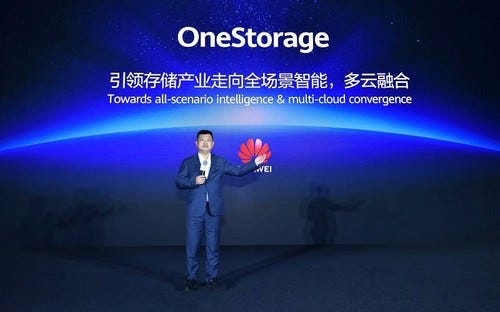Towards all-scenario intelligence and multi-cloud convergence
Huawei has introduced OneStorage, the next-generation data storage solution that provides on-demand storage resources and automatic data O&M management.
October 5, 2020
SHANHAI – At HUAWEI CONNECT 2020, Huawei introduced OneStorage, the next-generation data storage solution that provides on-demand storage resources and automatic data O&M management. Huawei wanted to shine the limelight on the solution's open framework and multi-cloud convergence capability. For Huawei, this was an opportunity to show how OneStorage is the next step toward all-scenario intelligence and multi-cloud convergence.
Figure 1: Peter Zhou, President of Huawei IT Product Line 
At the summit, Peter Zhou stressed the advantages of each component of the OneStorage solution. First, he noted that the next-generation data management engine (DME) and fully distributed, memory-fabric OS sit at the core of the solution. The DME achieves automatic data storage management throughout the lifecycle, making management visible, controllable, and traceable. Likewise, the OceanStor OS supports heterogeneous computing power, multiple media, diversified networks, and various types of dedicated hardware. It provides services for OceanStor Dorado Series (enterprise storage) and OceanStor Pacific Series (mass data storage) to meet needs in diverse scenarios like core enterprise systems, mass data, and edge data. In addition, the OceanStor OS leverages the fully distributed, memory fabric to build global memory, while also achieving high reliability and ultra-low latency (10 μs).
Data storage is the basis of any data infrastructure, but as we move toward a post-digital era, data storage faces three major challenges:
Low storage resource utilization (< 40%) due to siloed storage in data centers, as well as difficult data value extraction due to lack of data mobility between storage devices
Inefficient management due to complex, time-consuming, and labor-intensive O&M
Complex cloud convergence, cloud silos, and difficult integration between traditional enterprise-class storage and clouds' native storage services
The next-generation storage solution OneStorage helps customers address the preceding challenges and provides the following benefits:
One pool for storage on demand and non-disruptive data mobility
The solution consolidates different storage forms, including all-flash, converged, high-density, and Blu-ray, into a unified storage resource pool. The solution designs storage SLAs tailored to application scenarios and allocates storage resources on demand, shattering data silos and maximizing resource utilization.
In addition, data flows freely to suit different SLAs based on the full lifecycle policy, ensuring that data is always stored in the most appropriate location and maximum data value is extracted.
One engine for intelligent data management
OneStorage brings intelligence to you with DME, offering automation for all scenarios, including data storage planning, provisioning, O&M, and optimization.
Planning: With the customer's authorization, the system automatically collects the minimum necessary configuration information from the site to gain quick insights into customer networks. Based on best practices and expert experience, the system outputs SLA models that meet application requirements.
Provisioning: The system automatically schedules, allocates, maps, and mounts storage resources for each SLA.
O&M: The system quickly diagnoses root causes of problems, locates fault points, offers troubleshooting suggestions, and automatically isolates or rectify faults based on preset policies.
Optimization: The system provides QoS adjustment, data mobility, and capacity scalability to meet the performance and capacity needs caused by service workloads while maintaining service continuity.
One framework for multi-cloud convergence
The solution runs on a unified, open software framework and uses standard northbound and southbound APIs to make storage and multi-cloud convergence possible.
One pool for multiple clouds avoids storage management silos. The enterprise-class features of Huawei storage, such as replication and active-active features for data protection, are smoothly integrated into HUAWEI CLOUD as services to provide cloud disaster recovery, backup, and other data protection capabilities on the cloud. Those capabilities cannot be achieved without the fully distributed and memory-fabric Huawei OceanStor OS, which supports heterogeneous computing power, multiple media and networks, and various types of dedicated hardware. Furthermore, Huawei OceanStor Dorado Series (enterprise storage) and OceanStor Pacific Series (mass data storage) use the unified OceanStor OS for diverse user requirements in different storage scenarios.
Peter Zhou described how Huawei is ready to work with anyone to supercharge the development of the digital economy. He said, "Huawei is committed to delivering higher efficiency, better performance, and more agile services. We always provide the ultimate simplicity to our customers and partners, taking care of the complex part ourselves to make it easier for others to edge closer towards all-scenario intelligence and multi-cloud convergence".
HUAWEI CONNECT 2020 is an annual flagship event hosted by Huawei for the global ICT industry, and is being held in Shanghai from September 23 to 26, 2020. HUAWEI CONNECT is an open platform designed to help our customers and partners navigate these changes, share experience, and work together to create new value. At this year's event, we will explore trends and opportunities in industry digitization; showcase advanced ICT technologies, products, and solutions; give an insider's look at what joint innovation really means; and share best practices in digital transformation. Our ultimate goal is to build an open and sound industry ecosystem that will benefit all stakeholders and create new value for all industries. For more information, please visit:https://www.huawei.com/en/events/huaweiconnect2020/.
You May Also Like


_International_Software_Products.jpeg?width=300&auto=webp&quality=80&disable=upscale)







